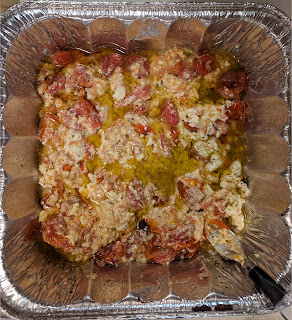 |
I had heard about that viral feta and tomato Tik Tok recipe, but I never got around to trying it. I thought it might make a good recipe for Passover with such simple ingredients and technique: a block of feta, a carton of cherry tomatoes, some garlic, some olive oil, a little black pepper, all things I have around the house at Passover. But I missed one of the ingredients: pasta! Not really, a Passover-friendly ingredient! I figured the pasta was just a side dish so I substituted matzah farfel. But when I put it all together, I realized that the feta and tomato was just supposed to be a sauce, and the pasta was the heart of the recipe. Oops. Back to the old drawing board...
I tried it again, this time substituting some zucchini, sliced and quartered, and some chopped nuts for extra protein. I used chopped hazlenuts because that's what I had around the house, and I really liked the way that flavor went with the flavor of the feta.
This recipe requires very little effort (that is certainly why the original went so viral on Tik Tok) but it does take 45 minutes for the tomatoes and feta to bake to perfection. And the ingredients are pretty straightforward for Passover.
This recipe is not vegan (includes cheese) but is gluten-free.
Ingredients
- 1/2 cup extra virgin olive oil
- 2 pts cherry tomatoes
- 8 oz block of feta cheese
- 3 cloves garlic, pressed
- sprinkle of salt and pepper
- 2 or 3 zucchini, spiralized or cut to small chunks (sliced and quartered)
- 1 cup chopped hazlenuts (or other nuts if preferred)
Kashrut Notes
- Extra virgin olive oil is kosher for Passover without any special Passover certification as long as it doesn't have any flavorings or additives. It's a Passover staple.
- Fresh tomatoes, zucchini and garlic from the produce section are not a Passover problem.
- Hard cheese like feta requires kosher certification generally because of the ingredients used to harden it. I am very partial to Miller's brand of feta cheese blocks.
- Regarding nuts... I had always heard that nuts required Passover certification because the preservatives (BHA and BHT) are suspended in corn oil, a kitniyot ingredient traditionally forbidden. But I recently heard that BHA and BHT have gone out of fashion for health reasons and aren't used much any more! And the FDA requires listing them on the ingredients so you don't have to worry about them sneaking in! So Orthodox sources are saying that raw nuts don't require Passover certification... unless the label says they are processed in a place that processes chametz (e.g., wheat) or kitniyot (e.g., soy). Oops. I stick with the certification, but it may not be as necessary as it once was
- Salt: There are salts that do not require certification, but they are very hard to find because they have to exclude ingredients that almost all salts include. Get some kosher salt for Passover or skip the salt.
- Pepper: Ground spices require Passover certification because of anti-caking agents and the risk of cross-contamination or dilution with not-for-Passover ingredients. If you can't find it certified, use whole peppercorns with a grinder set aside for Passover use. Or skip the pepper.
Preparation
- Preheat oven to 400 degrees
- Combine the tomatoes, salt, pepper and garlic with most of the olive oil (not quite all)
- Pour the tomato mixture into a deep 8 x 8 baking pan
- Put the entire block of feta in the middle of the tomato mixture, drizzle the rest of the olive oil on top and sprinkle a little more salt and pepper on top of that (see picture at top)
- Put the pan in the oven and let it bake for about 45 minutes, until the feta is starting to brown and the tomatoes are starting to burst
- When it's ready, take the pan out of the oven and put it on the stove to cool a little
- Prepare the zucchini and nuts (if they're not already ready) and put them in a large bowl
- Mash the feta into the tomatoes and mash the tomatoes too. Get it as smooth as you can. (see picture below, although that's not really very smooth...)
- Pour the mash (now a sauce) over the zucchini and nuts, mix them together and serve
